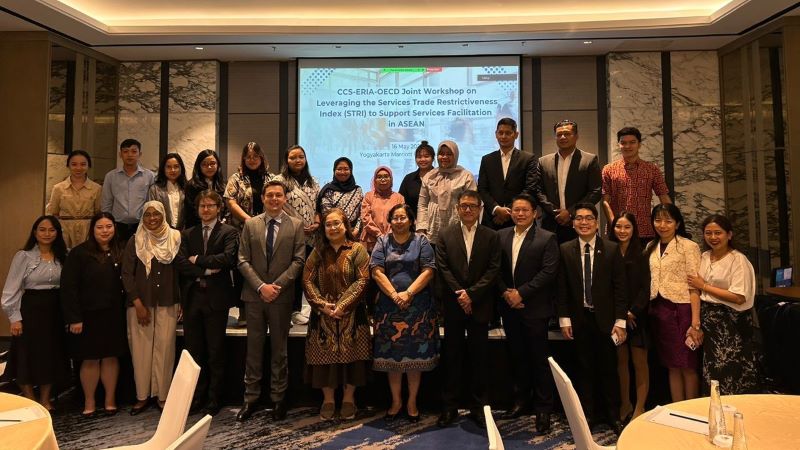CCS-ERIA-OECD Joint Workshop on Leveraging the Services Trade Restrictiveness Index (STRI) to Support Services Facilitation in ASEAN
Share Article:
Print Article:
Yogyakarta, 16 May 2023: Recognising the significance of services trade in enhancing regional trade, promoting economic resilience, and fostering employment, productivity, and innovation, the leaders of ASEAN have emphasised the need for trade facilitation and deeper economic integration. The ASEAN Community Vision 2025 has also outlined the goal of achieving a highly integrated and cohesive regional economy that supports sustained high economic growth through increased trade, investment, and job creation, particularly in the services sector.
By facilitating services trade, regional trade can be promoted, economic resilience can be enhanced, and new sources of employment, productivity, and innovation can be encouraged. Therefore, upon the request of the ASEAN Coordinating Committee on Services, the ERIA Policy Design Department collaborated with experts from the Organisation for Economic Co-operation and Development (OECD), Mr Janos Ferencz and Mr Matteo Fiorini, to share their expertise on the Services Trade Restrictiveness Index and its application through a technical workshop during the 104th meeting of ASEAN CCS in Yogyakarta, Indonesia, on 16th May 2023.
The workshop provided valuable insights and support to government officials from ASEAN Member States in their efforts to facilitate services trade within the region, with a specific focus on leveraging the new ASEAN STRI (Services Trade Restrictiveness Index). The STRI serves as an evidence-based tool for identifying best practices in services trade regulation, improving regulatory conditions for trade and investment in services, and enhancing export competitiveness in the services sector.
The workshop saw the participation of over forty attendees, including officials from various ministries representing all ten ASEAN member states. Dr Intan Murnira Ramli from ERIA, during the opening session, emphasised the importance of policymakers effectively utilising the STRI to facilitate services trade in the region. Ms Basaria Tiara Desika Lumban Gaol, the Director of the Directorate of Trade in Services Negotiation at Indonesia's Ministry of Trade, highlighted the significance of the analytical capacity of the ASEAN STRI in assessing the potential impact of reforms and fostering the exchange of ideas regarding the future use of the tool.
The workshop comprised three sessions. The first session provided an overview of the ASEAN STRI and its role as an evidence-based tool for services facilitation. The second session delved into the analytical capacity of the STRI tool and was conducted by two experts, Mr Janos Ferencz and Mr Matteo Fiorini, both trade policy analysts from the Trade Policy Division at the OECD. These sessions included presentations, group discussions, and a quiz for participants, culminating in group presentations on the utilisation of the STRI tool.
The third session focused on sharing experiences in the utilisation of the STRI within ASEAN and its member states, with Mr Tan Tai Hiong, Assistant Director and Head of the Services and Investment Division at the ASEAN Secretariat, leading the presentation.








